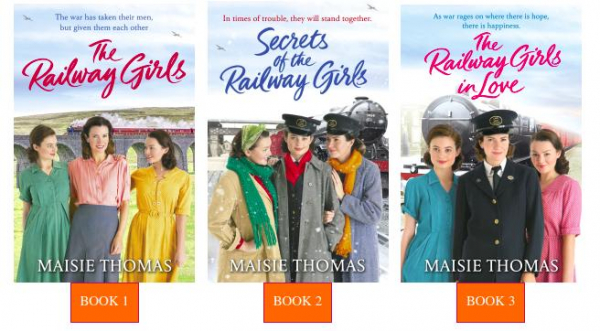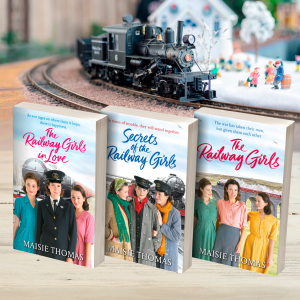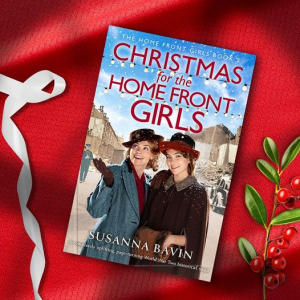All This and the Housework Too…
A Look at Women’s Lives and Work on the Home Front
Wartime Britain couldn’t have managed without women. Like the Great War before it, the Second World War opened up women’s lives to work possibilities that would never have been possible in other circumstances. With able-bodied men away fighting for King and country, women also served their country – by taking over the jobs that had been vacated as well as tackling specific roles that had come about because of the war.
Many women worked long shifts day and night, plus compulsory overtime, in munitions factories, churning out bombs and ammunition that were urgently needed. My mother worked in a munitions factory in Farnborough, though she wasn’t on the production line. She was a bright girl who had gone to grammar school, where she’d gained a distinction in mathematics in her School Certificate. The bombs and missiles in the munitions factory were designed by experienced engineers and my mother’s job was to double-check their maths and measurements. (If you’ve read The Railway Girls books, the job done by Joan’s sister Letitia was my mother’s job.) Mum thought nothing of it at the time, but in later life she looked back and realised how galling it must have been to these skilled professional men to have their work checked over by an inexperienced young woman – and she was young. She was only 15 when war broke out.
It wasn’t just in war-related jobs that women were needed. They stepped into all kinds of ‘ordinary’ roles – becoming bus conductors (known as clippies – a name that stuck for many years, until the job of the bus conductor vanished), hospital porters and delivery drivers. Bottles of milk arrived on the doorstep every morning courtesy of the milk-lady and letters were pushed through the letterbox by the post-lady.
h
Like Pamela in The Home Front Girls, many women joined the Land Army to work for farmers and keep the country fed. Some were placed in the Timber Corps, where they worked as lumberjills.
h

In my WW2 series written as Susanna Bavin, The Home Front Girls, Sally, Betty and Lorna work in a salvage depot, the salvaging and recycling of all kinds of items being an essential activity at a time when everything was in increasingly short supply. ‘Saucepans into Spitfires’ was the popular and inspirational slogan for a drive to collect aluminium in the summer of 1940. The housewives of Britain proudly gave up their pots and pans, vacuum-cleaner tubes, coat-hangers etc. Throughout the war, everything was salvaged – paper, string, metal, glass, rubber, rags. Food-waste went into the pig-bin, except for the bones, which went in the bone-basket (to make glue, explosives, soap, fertiliser and animal-feed). Silver-foil milk-bottle-tops were kept and given back to the milkman. In the spring of 1943, it became an offence to throw away waste paper.
Other Home Front Girls characters, including Sally’s lifelong chum Deborah, work in the local Food Office, enforcing rationing restrictions and providing information about how to make cakes without eggs and, at a time when ‘meat and two veg’ was the norm, satisfying main meals without meat. And the Town Hall clerks who, before the war, would mostly have been men, are now female.
As Maisie Thomas, I also write The Railway Girls series. One of the first things I had to decide was how my characters were going to get together regularly so that they could become friends. One possibility – perhaps the easier one – would have been to put them all to work in the same job so they would naturally meet up on a daily basis.
But once I started looking into the types of work that women undertook on the railways, that idea was quickly scotched. I’d already thought about the obvious roles performed by station staff – ticket office staff, porter, ticket collector, Lost Property and so on – and by staff on the trains – parcels porter, ticket inspector, guard. But there were so many other jobs besides. Crane-drivers, welders, electricians, steam-hammer operators, lathe operators. Engine-cleaners, riveters, lamp-cleaners. Women to work in the signal-boxes, women to oil the points, women to shovel cement into moulds to make sleepers for the tracks, and women to keep the ballast level beneath the sleeps on the tracks. This latter, the work of the ‘lengthmen’ because they worked certain lengths of track, was the job assigned to Mabel when, for her own secret reasons, she refused to be a driver.

Cordelia became a lamp-woman, cleaning the lamps on the engines and wagons and also walking alongside the railway to climb up to clean the signals. Lizzie, Joan and Emily all worked as station porters, and Dot was a parcels porter. This meant she travelled on the train putting off parcels at the appropriate stations and taking new parcels on boards. Incidentally, ‘parcel’ was a catch-all term that simply meant anything that was transported by train – be it a trunk of luggage, a flock of sheep, a bouquet of roses or a punnet of strawberries. In the first book, The Railway Girls, Dot has an unfortunate experience with a goat that has its own ideas about how parcels should behave!

h
Colette works as a wages clerk, which was also the job that Alison started off in. For reasons that become clear if you read the books, she went on to have a series of different jobs covering various aspects of railway work. And Persephone started out as a ticket-collector and is then promoted to the post of ticket inspector. As a cleaner of locomotive engines, Margaret has one of the most physically demanding tasks.

But it wasn’t just in the many different workplaces that women did their work. They put in long hours doing their war work, whatever it was, and then they went home to their domestic duties. There was a broad assumption at the time that domestic responsibilities would not be neglected, even though women didn't actually get any acknowledgement for keeping their homes running smoothly and looking after their families. It was just assumed that they would do this on top of doing their war work and it was utterly taken for granted – even though cooking meant becoming increasingly inventive in the face of rationing and shortages, and shopping meant spending ages in long queues with no guarantee of being able to buy what you needed when you eventually got to the front. There were some employers who allowed full-time female workers to have time off during the day as ‘queuing time’ in return for a later finish (such as Mr Harris in the third Home Front Girls book, Christmas for the Home Front Girls), but these employers were few and far between.
And as for the pay – well, you probably won’t be surprised to know that women automatically earned less then men they had replaced, even though they were doing the same jobs. Something I discovered while researching for the Railway Girls books was the way DOP worked. DOP meant ‘difference of pay’. If the head of a department was off work, then the deputy took on his duties and, for doing so, was awarded DOP, which meant having his wages topped up… but only if the deputy was a man. A female deputy wasn’t given this. Naturally, I couldn’t resist adding this to one of the Railway Girls plots!
Therefore you may care to raise three hearty cheers for the men at the Rolls Royce plant, who in 1943 joined the women in their strike action to gain equal pay for women workers. Before the strike, women earned 43 shillings a week, as compared to 73 shillings for the men. Rolls Royce agreed to pay according to job and not gender and the strike ended.
* * * *
| Link to The Railway Girls books on Amazon. |  |
 | Link to The Home Front Girls series on Amazon. |


Make A Comment
Comments (0)